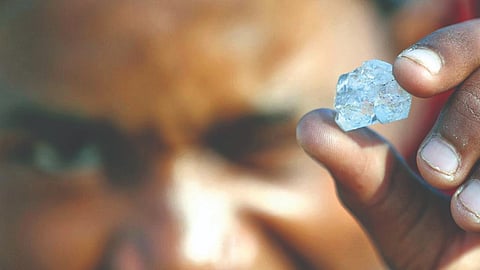

By Neusa e Silva
In diamond-rich parts of Africa, the revenue generated from mineral extraction does little to improve quality of life for the people who live in those countries, with Botswana being the only exception. Instead of uplifting communities through mineral riches, many people find themselves stuck in a vicious cycle of exploitation and abuse. DW asked diamond industry insiders and experts why the extraction of the gemstones fails to result in local socioeconomic benefits.
In the Democratic Republic of Congo, said African Diamond Council Chairman M’Zee Fula Ngenge, there’s a history of conflict brought about by “pervasive greed, post-colonial secessionism, as well as a customary erosion of public sector accountability and government management.” Ngenge believes only a select few get to directly benefit from the hard labor of miners, keeping the workers barely surviving in order to continue exerting power over them. Regional conflicts not only add to this mix of control and illicit oppression but actually benefit the big names in the diamond trade, allowing them to set the going rate for labor according to how desperate miners are to make money.
This scenario of conflict in Congo is similar in other African countries with large mineral riches as well, said Ngenge, highlighting that many nations in the region are “deliberately targeted [by the diamond industry] for their political and social instability.” “All the countries surrounding the DRC are at risk of being destabilized, resulting from a concentrated aim or focus to extract, abuse and defraud,” he said. What Congo, Angola, Mozambique and many other mineral-rich countries in Africa have in common is the fact that there are two markets for the exploitation of mineral resources: there is a formal extractive industry, which is subject to at least some level of oversight, and a clandestine one, which is dominated by miners and their sponsors.
To understand how the clandestine market for producing and trading diamonds operates, DW visited the diamond mining town of Cafunfo in Angola’s Lunda Norte province, located near the border with Congo.
Caiongo Adelino has been an informal miner — or garimpeiro — for over 10 years. The 49-year-old said that as a general rule, groups of garimpeiros have sponsors who pay for their trips deep into the bush to extract diamonds illegally and later, these sponsors buy the diamonds off them. “The last time I sold a diamond it cost $1,250,” Adelino told DW. “But these are not real prices, because the table that is used for us garimpeiros is one, and the market where they sell the diamonds is another.”
The clandestine market for buying and selling the precious stones — particularly diamonds mined by the garimpeiro — is largely dominated by foreigners: Senegalese, Chinese, French, Eritreans, Guineans and Congolese intermediaries, who are not invested in lifting up the local communities. This is even reflected in their business model: A sponsor distributes essential goods to the garimpeiros for their subsistence in the bush, after which the value of the goods distributed is deducted from the cut that is due to the garimpeiros when they return to sell the diamonds.
Data from the African Diamond Council indicates that in the case of smuggled rough diamonds of African origin, an estimated 28% to 32% of revenue out of the total African diamond production is lost. Ngenge said this lost revenue pertains specifically to rough and natural, undocumented or uncertified diamonds which are smuggled to the main diamond centers outside of the continent.
This article was provided by Deutsche Welle
Visit news.dtnext.in to explore our interactive epaper!
Download the DT Next app for more exciting features!
Click here for iOS
Click here for Android